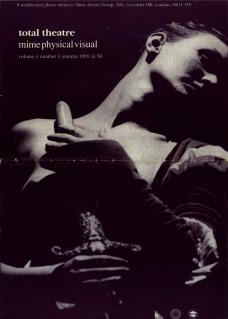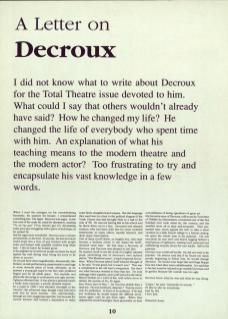When I read the eulogies on his overwhelming humanity, his passion for beauty, I remembered something else. His rages. Decroux was angry. At the low end of the scale he could be dismissive, snarling ‘Tu ne l'as pas’ (‘You haven't got it’), devastating some poor guy struggling with a piece of technique as he passed by.
But his rages were wonderful. Decroux was a volcano permanently on the boil. At seventy, his face and neck could erupt into a fury of red, knotted with purple veins and framed with carefully combed long white hair. I bet he knew he looked good. In his eighties he would turn purple and beat his head against the wall during class, being led away to lie down to recover.
He should have died magnificently; dramatically, like Moliere, in mid-performance; passionately in mid-rage at some slovenly piece of work; delicately, as he assisted a young girl pupil to her feet with proffered fingers and fin de siècle grace. Not mentally and physically decaying in unnecessary and ugly poverty. Ugliness offended him. It was almost a personal insult; a badly done exercise, a poorly phrased request.
As a pupil in 1968 I was elevated overnight to the 'anciens', the advanced class, though I had only been with him for three months. Not, unfortunately, through my own staggering expertise, but because the current 'anciens' had formed a deputation to make some fairly straightforward request. But the language they used was too close to the political slogans of the Trade Unions that had brought Paris to a halt in the riots of '68. He was not having that in his school and he threw them out in a fury. Favoured and talented students who had been with him for years rocketed streetwards, as many others, equally talented, had done many times before.
One of them, Geoff Hoyle, an English boy who later became a brilliant clown in the States, ‘Mr Sniff’, returned years later. He had been a favourite of Decroux, and Decroux was pleased to see him.
He wanted Geoff to see the work of a highly talented pupil, performing one of Decroux's own stylized pieces, ‘The Washerwoman’, a mark of special favouritism. When Decroux asked Geoff what he thought of it, he said, ‘It was good, but it wasn't you.’ This was a compliment to the old man's uniqueness. But that's not what Decroux wanted to hear that day. He took umbrage, blew a gasket, and Geoff arrived at the Metro Marcel Sembat on a wind of fire, with orders never to darken the portals of No. 85 again.
Jean Dorcy says of him: ‘… he was less pliable than a steel bar. He was intolerant, despotic.’ True he strove only for perfection. In front of an audience if he had any weakness he would repeat the difficult movements again until he got them right. When they objected he would harangue them personally on their unworthiness of being spectators of great art.
My favourite story of Decroux, told to me by Yves Marc of Théâtre du Mouvement, concerned one of the first holidays he ever took, when he, the century, and the weather were all in their mid-seventies. They persuaded him, much against his will, to take a short vacation in a little French village in a historic setting He spent the whole time in his pyjamas. On one excursion he was seen and heard, lagging behind a small group of sightseers, making loud, personal and unflattering remarks about the tour leader. Still in his pyjamas.
Decroux was a rebel all his life. He did not want to be popular. He always said that if he found too many people beginning to follow him, he would change direction. He would wear large hats and huge floppy bow ties when they were unfashionable. It is said that in his last years he refused to go outside his house and its garden because life outside was too ugly.
Decroux knew what he was and what he was doing.
‘J'aime,’ he said, ‘emmerder le monde.’
I'd like to shit on everybody.
And he did.
I love him.

